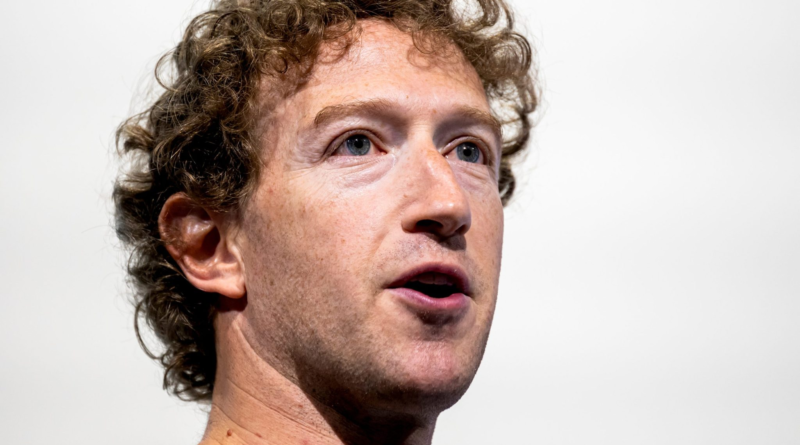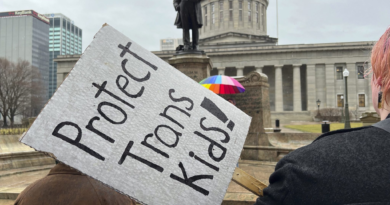Meta is slapped with a $839 million antitrust fine for favoring one of its own services
Good morning. If you haven’t heard Mark Zuckerberg’s filthy duet with rapper T-Pain—an acoustic cover of Lil Jon’s Get Low—then you’re missing out on…something.
And if that leaves you thirsty for more musical-tech-exec action, then how about Twitch CEO Dan Clancy taking a decent shot at John Denver’s Take Me Home, Country Roads? Or Apple software chief Craig Federighi shredding on the guitar?
Okay, none of them should quit their day job, but then there was Microsoft cofounder Paul Allen, who once did a convincing blues-rock thing with his band The Underthinkers. And Patreon CEO Jack Conte is half of not one but two viral video musical duos, Pomplamoose and Scary Pockets. Those are some tough acts for Z-Pain to follow. —David Meyer
Want to send thoughts or suggestions to Data Sheet? Drop a line here.
Meta hit with $839 million antitrust fine

Europe’s antitrust enforcers have fined Meta €798 million ($839 million) for tying Facebook Marketplace to Facebook itself.
The European Commission said that automatically showing the marketplace to the social network’s users massively disadvantaged other classified-ad providers.
It also said Meta had imposed “unfair trading conditions” on those other classified-ad providers when they advertise on Facebook and Instagram, allowing Meta to “use ads-related data generated by other advertisers for the sole benefit of Facebook Marketplace.”
Meta, which has never had to pay an EU antitrust fine before, will appeal. It claims there’s “no evidence of competitive harm.”
This is likely to be the parting shot from antitrust commissioner Margrethe Vestager, who has relentlessly attacked Big Tech over the decade she’s held the role. A new Commission is incoming; the likely new competition chief Teresa Ribera endured a reportedly rowdy confirmation hearing this week. —DM
Social media’s fragmenting landscape
The deluge of goodbye messages from people leaving X began shortly after Donald Trump’s election victory last week.
Daily users of X, previously known as Twitter, have declined consistently since Elon Musk acquired it in 2022. Last year, it had roughly 250 million daily active users but only 162 million on election day last week—and even that was a yearly high, according to Sensor Tower, a market intelligence firm that tracks the platform.
But the public declarations about leaving, at least, seemed to have accelerated after the election, as many left-leaning users said they’d enough of Musk’s support for Trump and of what they perceived as the growing nastiness on the site. Instead, many say they’ll move to rival social media service Bluesky or Threads, owned by Facebook-parent Meta.
Instead of just of a tiny number of extremely popular sites for posting news, opinions, and memes, as has been the case for more than a decade, the social media landscape may be fragmenting into smaller but more numerous pieces. —Kali Hays
Cruise hit with $500,000 fine for misleading crash report
GM’s Cruise self-driving car unit must pay a $500,000 fine for misleading investigators about a crash last year involving a pedestrian being dragged under one of its vehicles in San Francisco.
The penalty, according to the Washington Post, resolves criminal charges against Cruise, the U.S. attorney’s office of Northern California said. The company must also implement a safety program and submit annual reports about its compliance to the government.
Cruise’s autonomous vehicle dragged a pedestrian underneath it after the person had already been hit by another car driven by a human. Prosecutors said that the company had withheld information about crash “with the intent to impede, obstruct, or influence” a federal investigation.
Previously, Cruise was ordered by the National Highway Traffic Safety Administration to pay a $1.5 million fine for the same incident. —Verne Kopytoff
Apple sued over “rip off” iCloud prices
A U.K. consumer group has slapped Apple with a legal claim about iCloud.
According to the group, called Which?, Apple has broken British antitrust rules by steering users to its own cloud storage service, allowing it to maintain high prices.
Thanks to a 2015 law change, the group gets to automatically include some 40 million British Apple users in its claim—it’s aiming for a £3 billion ($3.8 billion) fine and predicts an average individual payout of £70, if the claim is successful. Users can opt out if they like.
Apple responded to the lawsuit by saying: “Our users are not required to use iCloud, and many rely on a wide range of third-party alternatives for data storage…We reject any suggestion that our iCloud practices are anti-competitive and will vigorously defend against any legal claim otherwise.” —DM
Elon Musk is a misinformation machine, says his own AI chatbot
Elon Musk’s Grok AI chatbot has it in for Elon Musk.
User Gary Koepnick asked the AI who it thinks spreads the most disinformation on X, the Musk-owned social media site formerly known as Twitter, and the service did not hesitate in pointing a finger at its creator.
“Based on various analyses, social media sentiment, and reports, Elon Musk has been identified as one of the most significant spreaders of misinformation on X since he acquired the platform,” Grok wrote.
The technology later added, not so subtly: “Musk has made numerous posts that have been criticized for promoting or endorsing misinformation, especially related to political events, elections, health issues like COVID-19, and conspiracy theories. His endorsements or interactions with content from controversial figures or accounts with a history of spreading misinformation have also contributed to this perception.”
The AI also cited Musk’s large number of followers and high visibility on the service as helping him amplify the misinformation he posts and that it “can have real-world consequences, especially during significant events like elections.” —Chris Morris
More data
Chinese self-driving firm Pony AI seeks up to $4.5 billion valuation in U.S. IPO. Well see if the streets are paved with gold for autonomous vehicles.
CFPB looks to place Google under federal supervision, setting up clash. Google isn’t happy about it.
Disney’s $8.5 billion Indian merger is complete. Disney’s Star India and Reliance’s Viacom18 now have a joint venture with an 85% streaming market share in the country.
Google’s Gemini chatbot gets an iPhone app. It supports the Gemini Live voice mode, which came to Android a few weeks ago.
Oklo says two data center providers have signed up for its small modular reactors. Sam Altman backs this company.




